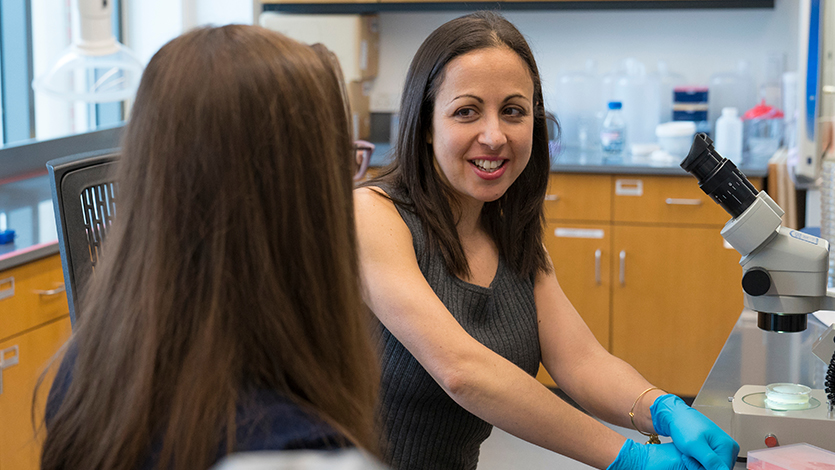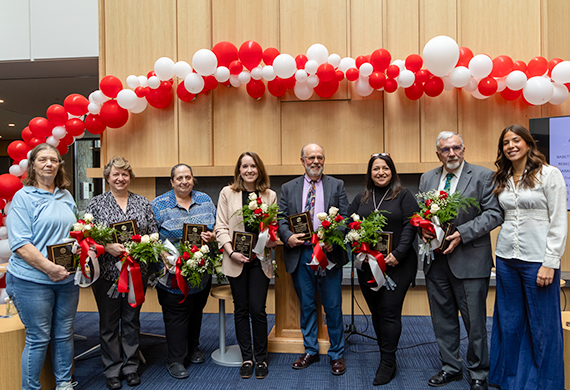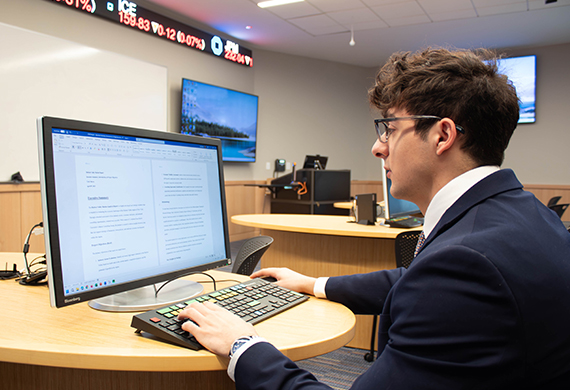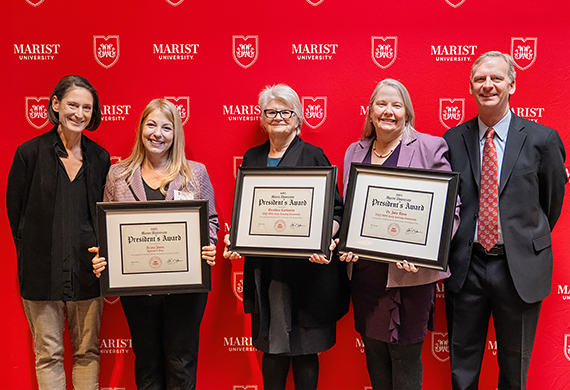Undergraduates Embark on Scientific Research

Students in Associate Professor of Biology Paula Checchi’s lab have recently published in two scientific journals.
April 13, 2021—Dr. Paula Checchi has an unwavering commitment to providing research opportunities for undergraduates in her biology laboratory in the Allied Health building. And it shows: Checchi and her students have recently published two papers in the scientific journals, PLOS ONE and Genetics.
“Engaging in research with undergraduates is a huge part of the reason I came to Marist,” said Checchi, an Associate Professor of Biology who has been with the College since August 2013. “We don’t often think of liberal arts colleges as being at the forefront of scientific research, but there are strong opportunities for undergraduates in this setting that they might not get at a larger university.”
Checchi’s work echoes a College-wide commitment to high-impact learning practices that include research and experiential learning.
Student Research Team
Checchi’s student collaborators for this recent work are primarily the work of Nicole Briand ’22, Esabelle Gervasio ’21 and Beatrix Bradford ’19, currently a Ph.D. candidate at New York University. Six additional Marist students/alumni were also co-authors on one of the articles.
Beatrix Bradford '19 (left) and Esabelle Gervasio '21 (right).
The article in Genetics is an educational review piece that can be used for teaching upper-level science classes, Checchi explained. The review covers the impacts environmental toxins such as bisphenol A (BPA) and similar compounds can have on human reproductive health.
“It was written entirely by undergraduates and a recent alumna who was previously in my lab,” said Checchi. “We started working on this piece once the COVID-19 pandemic started and we no longer had access to the lab. Despite this circumstance, I had eight students who were all taking research credit with me and wanted to continue being engaged in science, outside of the lab.”
The PLOS ONE article was the result of a cross-institutional collaboration with Vassar College Professor of Biology and Associate Dean of Faculty Kathleen Susman and her student. Gervasio and Bradford worked on the project at Marist. During this time, Bradford was invited to present their findings at science conferences in Barcelona, Spain and Sacramento, CA. The resulting article presented the results of the collaborative research which examined the effects of a noenicitinoid containing pesticide on the nonpathogenic, microscopic worm, Caenorhabditis elegans.
Both articles described how research with C. elegans can have wide-reaching implications for human health. “The mechanisms are relevant in human diseases such as infertility, cancer, and genetic diseases. C. elegans shares many genes as well as biochemical, developmental, and reproductive pathways with humans, so our findings in C. elegans may be applicable to humans,” said Briand, a biology major with dual minors in chemistry and psychology.
Research Experience is “Essential”
Bradford, a double major in biology and environmental science, spent three years in Checchi’s lab and the experience was a perfect springboard for her advanced studies. “The ability to do research as an undergraduate is not an opportunity everyone gets and I am very grateful I was able to have the opportunity to as it allowed me to realize that research is something I enjoy and would like to pursue as a career,” said Bradford, who is aspiring to pursue a research career within the field of toxicology. “I gained an understanding of how research is conducted, gain knowledge of a variety of laboratory techniques, and learn how to think and write scientifically. My experiences at Marist have served as the base of knowledge and skills which I have been further building and expanding upon in graduate school.”
Gervasio agreed. “The most significant thing about having access to undergraduate research opportunities is the ability to apply techniques you learn in your undergraduate courses to actual research projects. This allows you to not only have a greater understanding of the material in class but also you gain an understanding of the development of a journal article, how much work goes into published findings and most importantly you gain mentors like Dr. Checchi and Beatrix.” Currently Gervasio, who is double majoring in chemistry and math with a minor in biology (she’s also a Resident Assistant, championship diver and former Level 10 gymnast), is completing her senior Honors Program thesis with Checchi, developing a genetics course laboratory exercise based on the use of CRISPR, a genome-editing tool.
For Briand, research has been a key experience. “I’ve been able to gain insight into the roles and responsibilities of a scientist,” she explained. “As an undergraduate, this insight is essential for discerning if research is something I enjoy and would like to do for a career. Undergraduate research develops technical skills and offers opportunities for presenting and publishing research. These are elements that strengthen scholarship, fellowship, and graduate school applications.”



